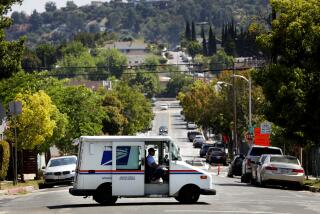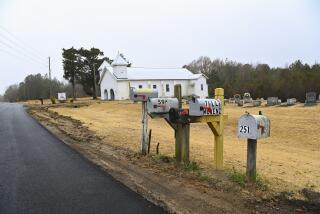Urban League Says Blacks Have Made Little Progress
- Share via
WASHINGTON — In a downbeat assessment of the economic and social progress of black Americans, a new Urban League report Tuesday said that disparities between whites and blacks are increasing, but the league chairman expressed hope for better times under President Bush.
“The State of Black America, 1989,” the league’s 14th annual study, found that blacks last year were three times more likely than whites to be poor, twice as likely to be jobless, suffered a decline in life expectancy and experienced increased segregation in housing.
Moreover, the study said, a black baby is twice as likely as a white one to die during its first year of life. And, it said, the number of black students enrolling in four-year colleges has dropped since 1980, contrasted with other minority groups--which have increased their enrollment. Illegal drug use, the report said, constitutes the “leading social, economic and health problem” confronting black people.
The 245-page report is a compilation of essays by scholars and researchers who focus on a broad range of issues that particularly concern black people.
Citing the report’s dire findings, John E. Jacob, league president, told a news conference: “In 1988, white Americans celebrated another year of economic expansion, but too many African-Americans were driven deeper into poverty and despair. In 1988, as in other years in the recent past, the gap separating the rich from the poor, whites from blacks, grew wider.”
Jacob said the gap between the races was reflected in the “tragic disturbances in Miami,” where blacks burned and looted for three nights last week after the fatal shooting of a black man by a police officer.
Jacob said that Miami’s black people were the only major ethnic group in the city whose unemployment rate rose during the 1980s. “As in other cities,” he said, “blacks did not share the prosperity and got more than their share of the misery.”
Nevertheless, Jacob cited a glimmer of hope for the future, portraying President Bush’s ascension to power as a potential antidote to eight years of rollbacks in federal social programs and policies under former President Ronald Reagan. Jacob’s comments, like those from other black rights activists, represent both an effort to encourage Bush to do better and a hope that he will.
“I expect the Bush White House to be a very different place from the Reagan White House,” Jacob said. He said he expects Bush to at least “maintain his ties to black leadership and to listen to our concerns. At best, I am hopeful that he will implement policies that close the tragic gap that puts African-Americans on a separate and unequal track from white Americans.”
Already, Jacob said, he is “encouraged” by Bush’s Cabinet choices, calling them “wise,” adding that “there are people at key departments with whom we can work.”
Jacob urged Bush to adopt the theme “Parity 2000” as an Administration goal, envisioning a coalition of government, the private sector and black people that could raise black social and economic conditions to the level of whites’ by the end of this century.
Among other federal programs, Jacob called for new initiatives on housing, the welfare system, health, education and jobs, writing in his overview of the report that such programs “are not liberal or conservative--they are just common-sense rational policies to reverse the backward drift to two societies, one rich and white, one poor and black.”
More to Read
Sign up for Essential California
The most important California stories and recommendations in your inbox every morning.
You may occasionally receive promotional content from the Los Angeles Times.












